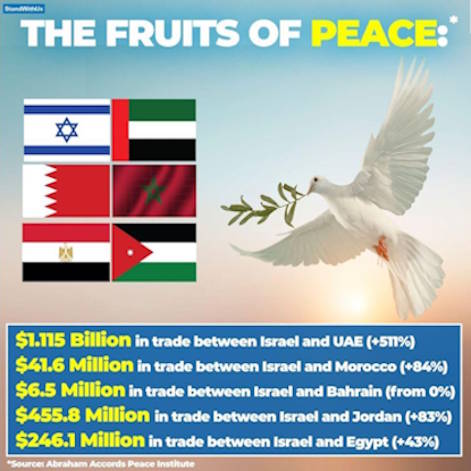
America Is Not A Broker
By Karen Schumacher
What qualifications should a presidential candidate have in order to be a president? Certainly, they should have experience serving in Congress for a deeper understanding of how the legislative branch creates laws in accordance with the Constitution. As part of that role, it would also be important that they understand their responsibilities in representing the people who elected them to office.
Interestingly, past presidents have primarily been lawyers, followed by some with military experience, a few teachers and farmers, and some businessmen such as the current president. Do any of these occupations make for a well-rounded president?
As a businessman and real estate developer, President Trump is running the country with this mindset, especially when it comes to the Mideast turmoil.
Starting with the Abraham Accords back in 2020, Israel, Bahrain, Morocco, United Arab Emirates (UAE), and a reluctant Sudan all signed on, focusing primarily on economic development of the region as a way of “normalizing” relationships and achieving peace. The hope was to eventually bring Yemen, Syria, and Lebanon into the economic scheme.
In 2019, White House adviser and Trump’s son-in-law Jared Kushner perceived the Israel-Palestinian conflict as “solvable problem, economically.” At the same time, Treasury Secretary Steven Mnuchin announced “Investors expressed such excitement about someday pouring money into projects on the West Bank and Gaza Strip,” adding “it’s going to be like a hot I.P.O.”
Kushner established the Abraham Accords Peace Institute in 2021 to advance the Accords and “promote trade, tourism and people-to-people exchanges between Israel and the Arab countries” with advisor Avi Berkowitz acting as a broker. This institute sounds more like a brokerage firm. “In close partnership with all public and private sector entities engaged in advancing the Accords…” the Institute muddies the water between the private sector and government. Regardless, under the guise of promoting peace and tolerance, billions of dollars are being raked in through Kushner’s other established firm, Affinity Partners. Just one more issue for the Senate to investigate. The firm, rather Institute, has now been turned over to the Heritage Foundation.
Meanwhile, Mnuchin may have been involved in his own shady deals as a probe was launched into his Middle East business dealings. All of these trips to the Middle East by Kushner and Mnuchin were costly to the taxpayers.
Even before Trump was re-elected to office for his second term, Kushner continued to work on how to move the region’s economic development forward. In 2019 he “praised the “very valuable” potential of Gaza’s “waterfront property,” suggesting that Israel should remove civilians while it “cleans up” the area.” Rather than peace it is an economic venture.
Again in October, 2024, since leaving the White House, Kushner all along had been discussing “US-Saudi diplomatic negotiations involving Israel with Saudi Arabia’s Crown Prince Mohammed bin Salman.” Certainly, this had nothing to do with the $2 billion Saudi invested in Kushner’s private equity fund but should be perceived as a potential “expansion of the “Abraham Accords.” However, it may be difficult as the Saudi Crown Prince has his own conditions for a Palestine state that might slow a potential agreement. What role is this playing in the current relations with the Middle East?
President Trump visited three Middle Eastern nations in May, procuring investment agreements in the U.S. worth $1.2 trillion. He also met with Syria’s President Ahmed al-Sharaa, encouraging him to join the Abraham Accords, meeting one of the original goals of the Accords.
While positively praising al-Sharaa, it is concerning that he is making deals with a former al-Qaeda insurgent who, upon arrest by the U.S., served time in prison, was connected to war crimes, and overthrew the Syrian government. Although al-Sharaa declares he wants peace, it will be a long time coming. al-Sharaa’s willingness to consider joining the Accords seems to be secondary to strikes on Iran by Israel. Given its instability, should Trump be using the U.S. to broker any economic deal with Syria?
‘Trump’s primary objective for the trip is to secure economic agreements with Saudi Arabia, Qatar, and the United Arab Emirates, urging these nations to expand their investments in the United States.” That is the truth for Trump’s “peace” making deals under the Abraham Accords, brokering economic deals between the U.S. and Middle Eastern countries. What happens when there is an economic disagreement and the countries pull out, will peace remain then? Even the World Economic Forum recognizes the Accords are nothing more than economic agreements.
“It is our true policy to steer clear of permanent alliances with any portion of the foreign world” was advise given by President Washington in his farewell address (pg 22). Good advice but ignored once again just as the Constitution is ignored. When, for whatever reason, Middle Eastern countries choose to pull out of the Accords, what type of economic damage will occur to the U.S. while the same ideological conflicts remain?
President Trump has brought his business experience to the Oval office and now an economic alliance with war torn countries. Maybe just following the Constitution and heeding a warning from a prior President should be the priority. Using America as a broker in deals with foreign countries is not the answer.